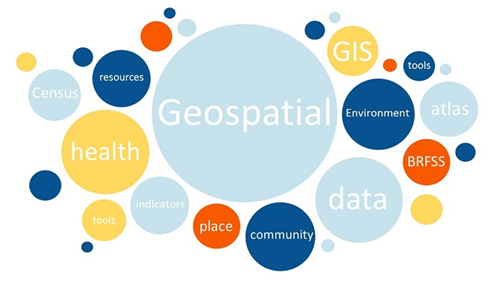
Geospatial Data Analytics for Physical Geography Impact Assessment on Environment, Health and Society
Geospatial data, in general, and Remote sensing data offers a detailed perspective on systems and locations that can be precious for applications ranging from natural resources management, environmental management, and weather observations to public health and disaster management. The World Meteorological Organization (WMO) released the executive action plan of early warning for all at the round table meeting on November 7, 2022. Early warning systems are imperative to adjusting to climate change adaptation and reducing disaster risk. Climate change poses a big threat to population health due to the increased risk of the spread of disease, natural disasters and air pollution, among many other things. In terms of analysis of cause-and-effect relationships, it is established that Environmental pollutants can cause health problems like respiratory diseases, heart disease, and some types of cancer. Environmental Factors that Can impact health include chemical pollution, water pollution, air pollution, climate change, disease-causing microbes, lack of access to health care, and poor infrastructure. The entire mankind is at risk of health starting from the level of pollution to psychological problems.
Geography doesn’t just determine whether humans can live in a certain area; it also determines people’s lifestyles as they adapt to the available food and climate patterns. In this context, spatial distribution of social variations is emerging at a fast rate, and a study on Social geography is of immediate need by which qualitative and quantitative assessment of the social relations, identities and inequalities could be facilitated as part of attaining the 17 UN sustainable development goals.
The unanswered question is “How is physical geography influencing social geography”. It is understood of late that social geography is being influenced significantly by physical geography, pinpointing that both the physical and social environment are potential contributors to the state of environment and Health. That is why the 2015 Lancet Commission on Health and Climate Change has been formed to map out the impacts of climate change and the necessary policy responses to ensure the highest attainable health standards for populations worldwide. The major concerns of the relevant and immediate societal issues are prescribed as the themes of this workshop which are given below
The workshop on “Geospatial data analytics for physical geography impact on the environment, health and society” will be part of the ISPRS Geospatial Week 2023, hosted by the Arab Academy for Science, Technology, and Maritime Transport, in parallel with several related geospatial workshops. The event will be held as a two-day single-track workshop of oral presentations and poster sessions in the context of the ISPRS Geospatial Week by WG III/9 on Geospatial environment and health analytics jointly with WG III/6 and ICWG III/IVa. Application of Geospatial Technology, Geospatial data analytics to Environment, Health and Disaster Management addressing various concerns related to societal geography form the essential themes to be discussed during the workshop.
CHAIRS
Themes of the Workshop
| Air pollution | Aerosols and AOD |
| Air /water quality | Vegetation |
| Disaster management | Land use changes and dynamics |
| Land degradation | Epidemiology and Disease mapping |
| GeoAI and Health analytics | Geospatial applications to Environment |
Research papers are invited with focus on application of Geospatial technogies including Remote Sensing to the following broad themes
The main concern is related to methods of extraction of the information from remote sensing images and remote sensing image sequences for application to understand pertinent environmental and socio-cultural issues related to the earth, environment and people.
Given below I to vi are the 6 grand challenges formulated so as to invite the potential authors to bring out their research results as a very specific outcome of the workshop to the maximum possible extent.
I.Environment and health are dependent on geographical variations, So understanding how physical geography is influencing social geography by using tools of geospatial technology is essential for effective management of environment. In general, we consider remote sensing data due its variety, veracity, volume and velocity is effective tool for addressing the unique challenges. These data are being made available for analysis from traditional systems such as high-resolution imaging sensors as well as innovative sources like mobile location data, social media, sensors from Internet-of-Things devices and crowdsourcing. So this is one challenge thrown to potential authors to address in their presentation.
II.Next challenge to be addressed by authors is on explanation related tp how much do the vegetation, climate, water cycle, and land formations which are all defined as physical geography, affect the society? People interact with their physical environment through the air they breathe, the water they drink, the houses they live in, and the transportation they access to travel to work and school.
III.The third one is on how can we create indicators derived from satellite data for assessing land use changes, urbanization, air and water quality and land degradation? They have an influence on natural resources management as well as the occurrence of various diseases, vector borne diseases, pulmonary diseases, food and waterborne diseases or non-communicable diseases.
IV.What is the current geospatial research for environmental management, air, water pollution and land degradation mapping, disease mapping, Health services, and geospatial epidemiology that could be operationalized through possible pivoting and scaling for appropriate interventions by the authorities?
V.The fifth challenge is about Remote sensing application to assessment of air quality and air pollution, atmospheric aerosols, atmospheric composition, and evaluating its synergism with other data sets, including constraining greenhouse gases evolution and exchange processes
VI.Disaster management is a great challenge and state-of-the-art Geospatial and GeoAI techniques application is emerging as a powerful tool. Here authors may address the challenges related to Geospatial Infrastructure Management Ecosystem (GeoIME), cloud-web-application including AI tools, early warning systems, monitoring, preparedness, data analytics, and algorithms for human detection from earth observations and UAVs/MAVs images etc.
Supporting ISPRS Working Groups:
- The workshop is proposed by WG III/ 9 Geospatial Environment and Health Analytics
- WG III/6 on Remote sensing of the Atmosphere and ICWG III/IVa on Disaster Management
are the supporting working groups.
Scientific Committee:
- Peng Yue, Wuhan University, PR China
- Weilian Li, University of Bonn, Germany
- Dr Suchita Gopal, Boston University. USA
- Dr Mahbooba Nasreen, University of Dacca, Bangladesh
- Dr Fazlay Faruq, University of Mississippi USA
- Dr Murthy Remella, Indian Space Research Organization, India
- Dr Nitin Kumar Tripathi, Asian institute of Technology, Thailand
- Dr Nelly Lucero Ramírez Serrato, National Autonomous University of Mexico, Mexico
- Dr Valli Manickam, Administrative Staff College of India, India
Special Issue dedicated to the workshop:
The authors of selected papers will be invited to submit extended versions of their papers to the –Journal of Photogrammetry, Remote Sensing and Geoinformation Science. The papers can be reviewed as per the current practices of ISPRS. (https://www.springer.com/journal/41064).




